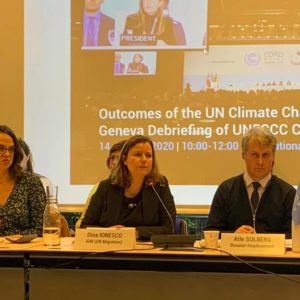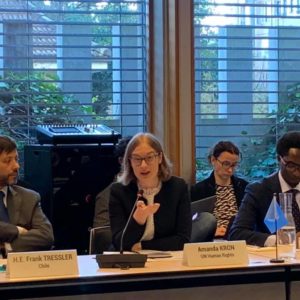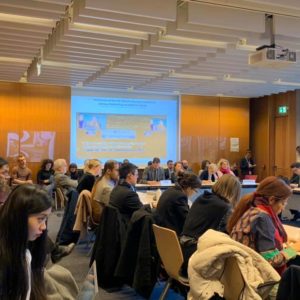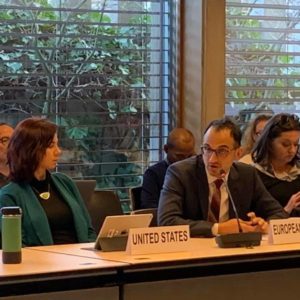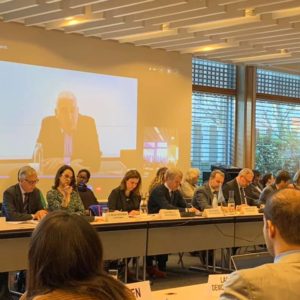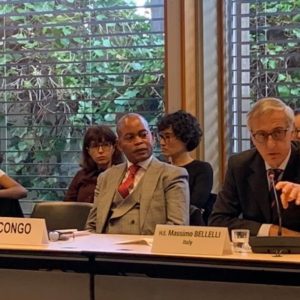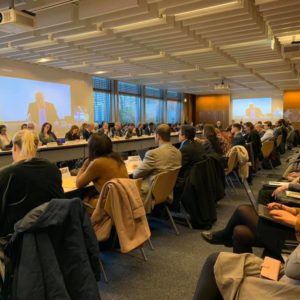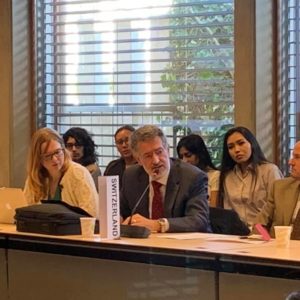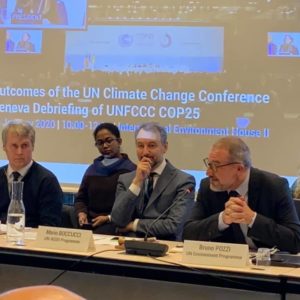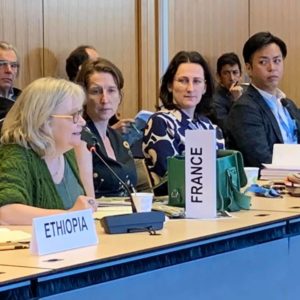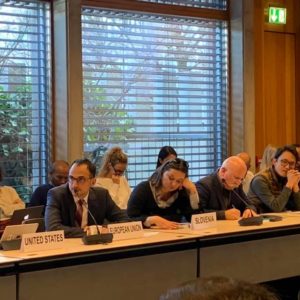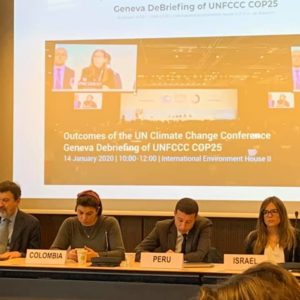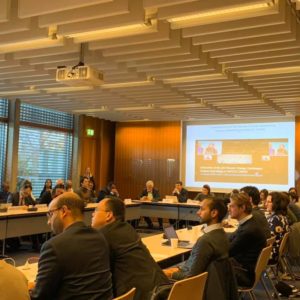Événement Conférence
Outcomes of the UN Climate Change Conference Geneva | Geneva DeBriefing of UNFCCC COP25
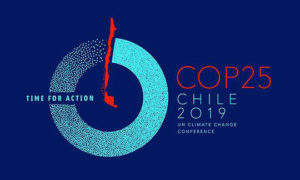
21 Jan 2020
10:00–12:00
Lieu: International Environment House II (7-9 ch. de Balexert)
Organisation: Geneva Environment Network
A debriefing of the 25th meeting of the Conference of the Parties to the United Nations Framework Convention on Climate Change (UNFCCC COP25), held in Madrid, Spain, from 2-13 December 2019, under the Presidency of the Government of Chile, took place at the International Environment House on Tuesday 14 January 2020.
About this Session
This event, organized within the framework of the Geneva Environment Network, addressed the links with processes ongoing in Geneva. Topics addressed include nature-based solutions, the just transition, climate migration and displacement, human rights and civil society.
Agenda
Welcome
Bruno POZZI, Director, Europe Office, UN Environment Programme
The Chile Presidency of the 25th Conference of the Parties to UNFCCC
H.E. Amb. Frank TRESSLER, Permanent Mission of Chile to the United Nations Office and other international organizations in Geneva
Introductory remarks by UNFCCC Secretariat (skype video connection)
Daniele VIOLETTI, Director, Finance, Technology and Capacity Building Programme, UNFCCC
Discussing the outcomes and the links with processes in Geneva
Nature-based Solutions at COP25
Mario BOCCUCCI, Head, UN-REDD Programme Secretariat
Just transition at COP25
M. Kamal GUEYE, Coordinator, Green Jobs Programme, International Labour Organization
Climate Change Related Displacement & Migration at COP25
Atle SOLBERG, Head, Platform on Disaster Displacement Secretariat
Dina IONESCO, Head, Migration, Environment and Climate Change Division, International Organization for Migration
Human Rights at COP25
Amanda KRON, Associate Expert, Climate Change and Environment, UN Human Rights
Civil Society at COP25
Sébastien DUYCK, Senior Attorney, Climate and Energy Programme, Center for International Environmental Law
Preparations for COP26
H.E. Miriam SHEARMAN, Deputy Permanent Representative, Permanent Mission of the United Kingdom of Great Britain and Northern Ireland to the United Nations Office and other international organizations in Geneva
H.E. Massimo BELLELLI, Deputy Permanent Representative, Permanent Mission of Italy to the United Nations Office and other international organizations in Geneva
Followed by Q&A
Summary
Welcome
Bruno Pozzi, Director, Europe Office, UN Environment Programme
- COP25 brought some disappointment, but disappointment does not stop hope
- UN will continue working to adaptation to climate change
- COP26 will take place in Glasgow at the end of the year
- Outcomes of COP25 feed in the 2020 super year of nature
- 2020 Kunming COP of the CBD
- Need for decisions on preserving biodiversity and promoting nature-based solutions, the other side of decarbonisation
- First year of the last decade to achieve the SDGs
- International community must act and deliver
The Chile Presidency of the 25th Conference of the Parties to UNFCCC (COP25)
H.E. Amb. Frank Tressler, Permanent Mission of Chile to the United Nations Office and other international organizations in Geneva
- Huge expectations: global attention, need to increase ambition on climate action
- Achievements of COP25 not enough
- Priority was to boost climate action to achieve sustainable development and call for collective action
- Important steps:
- Recognition of a reality – recognition of a gap between the current mitigation plans and the actions to cut emissions under the Paris Agreement: Parties must increase their ambitions
- Consequence of change – agreement on a work plan for response measures related to positive and negative effects of transitional-to-low emissions societies
- Gender issue part of the solution – new 5-years gender action plan, to support implementation of gender-related decisions in the UNFCCC process
- Oceans as a part of the solution – platform to incorporate measures related to oceans in the Climate Strategies
- Solidarity – review the Warsaw International Mechanism for Loss and Damage, dealing with how to support countries affected by irreversible and non-adaptable impacts of climate change: resulted in the creation of an expert panel to consider support for Loss and Damage and in the Santiago Network to facilitate support
- Ministerial Dialogue for Adaptation
- Finance matters – Coalition of Finance Ministers for Climate Action that laid out the Santiago Action Plan to bring climate considerations into the financial and economic process of decision-making
- Assign relevant tools – positive dialogues in the meetings of the Ministers of Science, Energy and Agriculture
- Difficulties that we have to overcome in the future COPs:
- Disconnection between science and decisions/negotiations
- Negotiations of Article 6
- Finance as a major topic of discussion: capitalisation of the Green Climate Fund, but both the Global Environment Facility and the Green Climate Fund were caught up in the debate of whether they should be focusing more on Loss and Damage
- COP25 was crucial to reach maturity, but in 2020 we need major breakthroughs
- Chile looks forward to COP26 and will foster cooperation on Climate Action
- The glass is half full half empty – we had expectations are were able to fulfil some of them, we still need to work on the other ones
- Climate Action is a process
Introductory remarks (Live from UNFCCC HQ in Bonn, Germany)
Daniele Violetti, Director, Finance, Technology and Capacity Building Programme, UN Framework Convention on Climate Change (UNFCCC)
- COP25 closed with several issues that remain unresolved
- This is a process where there are steps and milestones, as well as delays, but the process continues
- Next steps and decisions by the international community are crucial to guide the process
- Positive outcomes of the COP25:
- Decision 1/CP.25 “Chile Madrid Time for Action” – owning to the efforts of civil society, particularly the youth and indigenous peoples, in calling for ambitious and urgent Climate Action
- Recognition of the role of multilateralism – ensure the highest possible implication and adaptation efforts by all governments as well as the role of science in leading for action
- Important steps in technology and adaptation alongside the increase in capacity-building potential needed to implement the Paris Agreement
- Establishment of the Local Communities and Indigenous Peoples Platform (LCIPP)
- 5-years action plan on gender equality
- Progress on climate-friendly agriculture
- Large group of countries, cities, regions, businesses and investors are intentioned to reach net zero emissions by 2050 as part of the Climate Ambition Alliance
- Very large number of participants
- Gaps emerging from COP25:
- No agreement on the Work Plan for the Paris Agreement, particularly on Article 6
- Moving towards COP26, need to focus on realising the promises the Paris Agreement
Discussing the outcomes and the links with processes in Geneva
Nature-based Solutions at COP25
Mario Boccucci, Head, UN-REDD Programme Secretariat
- The glass is half empty perhaps related to the pace at which the negotiations are proceeding
- The glass is half full because we see ambitions and actions on the ground growing
- Very crucial area of intervention: nature-based solutions
- One third of climate mitigation can come from nature
- How can we use nature to deliver that climate mitigation contribution?
- Stopping deforestation
- Growing more trees
- Change the agricultural system
- Better eat
- Reduce food waste
- Protect oceans and coral reefs
- Actions that involve everyone
- We have seen in 2019 an unprecedented recognition of the effectivity of these actions
- Nature is a very important area of intervention
- COP25 brought on this need for nature-based solutions
- No more an “either … or …”, we need both
- Nature can buy us time to decarbonise our economies (reducing fossil fuel usage, …)
- Nature is not the only solutions, but an important component
- Recognition of the importance of nature-based solutions
- Call for taking the ambitions into action
- Nature Summit in New York during GA
- CBD COP in Kunming and COP26
- Launch an unprecedented decade of action:
- Nature must be featured in the enhanced NDCs
- Match ambitions with finance
- Everyone must engage in the development concrete action agenda for the decade to come
- UNEP entrusted to take this process forward together with governments and stakeholders
- Geneva as a very important role to play, given the presence of many nature-related organisations
Just transition at COP25
M. Kamal Gueye, Coordinator, Green Jobs Programme, International Labour Organisation
- Addressing climate change has move from an exclusively environmental matter to a human-centred approach to change
- Just transition is about the social and political drivers that are indispensable to scale up climate ambitions and countries have recognised that
- Addressing climate change involves a narrative: positive narrative related to the social impacts of climate change
- Climate action delivers more benefits to society than it will cost
- “On our current trajectory we are looking at a 3- to 4-degree temperature rise by the end of the century. But we can choose another path. The path of climate action and well-being for people and planet. And this path is about people’s jobs, health, education, opportunities, and their future.” UN Secretary-General, Madrid, 12 December 2019
- Paris Agreement: “Taking into account the imperatives of a just transition of the workforce and the creation of decent work and quality jobs in accordance with nationally defined development priorities”
- This mandate is taken up in the Improved Forum: positive development is the establishment of a six-year work plan
- “Katowice Committee of Experts on the Impacts of the Implementation of Response Measures”
- The Climate Action for Jobs Initiative: roadmap to support countries to put in place just transition plans to build the skills needed for new jobs
- There will be job loss, that is why social security is important
Climate Change Related Displacement & Migration at COP25
Atle Solberg, Head, Platform on Disaster Displacement Secretariat
- Members of the Task Force on Displacement that sits under the Warsaw International Mechanism for Loss and Damage
- Historical view on how displacement is dealt with under the environmental umbrella: COP16 (Cancún, 2010) is first reference on migration, displacement and planned relocation
- Review of the Warsaw International Mechanism for Loss and Damage revolved around finance, capacity-building, technical support and expertise
- Strengthening of the Warsaw International Mechanism for Loss and Damage as a positive outcome of the Conference
- Shortcomings around the institutional arrangement and financing
- All actions related to averting, minimising and addressing displacement need to find their place outside of the Conference (humanitarian response, humanitarian risk reduction, migration policy, …)
- Why the glass is half full:
- Recognition for scaling up on action supporting climate finance
- Linkage of the operative entities to the financial mechanism
- Expert group on Action and Support
- Establishment of the Santiago Network
Dina Ionesco, Head, Migration, Environment and Climate Change Division, International Organization for Migration
- There is a track to work on human mobility: 2-year work programme with very specific outputs
- A lot of interest in the COP25, a lot centred on human mobility
- Challenge within environmental negotiations is the multidisciplinarity and policy coherence – everything is connected
- SDG framework is excellent for fostering action
- The challenge is to connect all the different clusters involved, 4 of the most important are:
- Oceans: COP25 was a Blue COP, advances on legislation concerning oceans, to bring forward at COP26
- Biodiversity and nature-based solutions: ecosystem preservation and the connection between migration and conservation
- Awareness: enhance awareness on the connection between climate change and humanitarian actions both to the public and to the UN in general
- Regional approaches: action at regional level and advocacy by regional groups (Islands States, for instance)
Human Rights at COP25
Amanda Kron, Associate Expert, Climate Change and Environment, UN Human Rights
- Important because impact on Human Rights is showing right now
- Paris Agreement recognises that: “respect, promote and consider their respective obligations on human rights”
- Right-based approach results in better sustainable climate action
- Key entry points:
- Local Communities and Indigenous Peoples Platform (LCIPP)
- Gender Action Plan
- Warsaw International Mechanism for Loss and Damage
- Article 6 mechanism – rights-based approach: strong safeguards, meaningful and informed participation, ensuring access to justice
- Open Letter by the High Commissioner for Human Rights outlining the priorities, such as Article 6, enhanced ambitions on adaptation, mitigation and prevention
- Climate Vulnerable Forum called for a Special Rapporteur on human rights and climate change
- COP25 focused on youth and youth rights have been prevalent on the discussion on the climate crisis
- Issues to highlight:
- Enhanced ambitions on NDCs
- Include HR in NDCs
- Inclusive process on development of NDCs
Civil Society at COP25
Sébastien Duyck, Senior Attorney, Climate and Energy Programme, Centre for International Environmental Law (CIEL)
- Civil society came to COP25 with great hope thanks to the mobilisation of civil society in the months leading to the Conference, but there was also a sense of frustration for the gaps between science and ambitions
- Ambitions remain inadequate related to what science says and related to the targets of the Paris Agreement
- Change of venue is a symbol that countries face domestic challenges when they do not integrate sustainable development in their policies
- Theme of social inclusiveness has to be included in negotiations
- Expectations vs reality:
- Bridging the science-ambition gap
- Address the need for support of developing countries in the context of loss and damage – still unequal distribution of resources: some countries who have very little responsibility over climate change cannot mobilise as many resources to deal with the consequences, while countries who have more responsibility over climate change can mobilise more resources to deal with the consequences
- Place people and ecosystems at the core of environmental negotiations – some countries tried to use Article 6 negotiations to undermine the Paris Agreement, and markets should help implement the Agreement, not generate loopholes in the Agreement
- More momentum to enhance NDCs – only 15% of the emitters committed to more ambitious NDCs
- Importance of nature-based solutions: systematic implementation that can, on the one hand, empower local communities and, on the other hand, restore ecosystems
- Progress on just transition and Human Right – on Article 6 negotiations some countries oppose tools to establish green or social global finance
- San José principles to how carbon trading can be implemented under the Paris Agreement to protect the environmental integrity principles of the Paris Agreement, but they do not refer to Human Rights
- Importance of NDCs – countries need to make important commitments
Preparations for COP26
H.E. Miriam SHEARMAN, Deputy Permanent Representative, Permanent Mission of the United Kingdom of Great Britain and Northern Ireland to the United Nations Office and other international organizations in Geneva
- Disappointed by the pace and depth of the discussions: need to go faster and farther
- Experts considering the glass half full give hope
- Clear that COP25 had strongly diverging views among countries
- COP26 needs more ambition and commitment
- Glasgow is a sustainable city: 7th in the world and 1st in the UK in the Global Destinations Sustainability Index
- Ambitious and robust approach in offsetting travel of delegates, as well as running the events in a sustainable manner
- Partnership with Italy will put climate change and the protection of the environment at the hearth of the multilateral agenda
- Hosts need to lead by example: UK world leader in green growth and commitments on emissions reduction will be unaffected by Brexit
- Action on climate change has strong cross-party support in Parliament
- UK Mission in Geneva will harness the expertise based in the city and work together on the preparation to COP26
- Earthshot Prize launched recently: create a new wave of ambition and innovation around ways to help save the planet
H.E. Massimo BELLELLI, Deputy Permanent Representative, Permanent Mission of Italy to the United Nations Office and other international organizations in Geneva
- Expected more results from COP25, but the glass is half full
- Commitment shared with the UK on major points
- Work on providing solutions to the questions that are still open, on increasing ambitions and on revising the NDCs
- 2020 is going to be the year of ambitions – update of NDCs
- Leading by example + include stakeholders, particularly the youth and the private sector
- Italy is planning a meaningful event involving the youth and its proposals to participate in climate decision-making
- Importance of Africa in the process – Conference on Africa: most affected by climate change, but amazing potential in leading climate and energy transition
Questions
Association Climat Genève: Climate change causes an increasing number of disasters, such as floods, crop failures, but we are still building infrastructure that does not consider that. It does not really make sense, we should build more sustainable and adaptable structures.
Boris Engelson, journalist: Firstly, among the speakers, can those who believe 100% in what they said raise their hand? [Everyone raises their hands] My second question is: in the past, nations were able to take harsh action to tackle big challenges, nowadays it seems more difficult to convince even the public of democratic nations to vote for people who care about environmental protection, how can we confront that challenge? One last point, one definition of a pessimist is someone who sees only the glass half empty, another definition is someone who wear both belt and braces, but the most disturbing one is that a pessimist is a well-informed optimist.
Climate Action Network: My question is to all of you: you spoke about connecting all the dots, all the many things that we have to connect, how do you plan to connect the CBD COP and the UNFCCC COP, to make 2020 a super year? My other question is how are you engaging us, civil society, meaningfully in the discussion?
BP: I think everyone truly believes what they said during the panel, that action is possible and actually needed, and to demonstrate that I would say that what you heard today is not what you would have heard 5 years ago or even 6 months ago. We are constantly pushing for new ambitions, including nature-based solutions, which were not so much on the agenda previously, as well as biodiversity. A lot of financial actors are also pushing towards the cause that we are advocating for: sustainability and climate action. We see and we believe in change.
DI: It is a great question to see if you stand straight to your values and really believe in the values you defend, from a professional point of view we really saw immense progress in evidence, capacity, awareness, tools, practices. There are many gaps, but we saw so much progress and there’s a clear track, funding and practices to go forward. There is a lot of lack of trust between governments and civil society, but there is a lot of work that can be done together. A great question is also related to how we connect because everyone’s business can become no one’s business, every organisation comes with its own mandates and concerning IOM, we are developing a new strategy related to climate migration and through this strategy we will come into each specific area of the topic.
MS: Nature-based solutions are going to be very important in COP26. Civil society will be critical, and I will mention it to the organisers, but you can see the power of civil society in what Greta Thunberg managed to do. In terms of public attitudes, we have to continue to bring the facts to the people, to persuade everyone that disasters might struck us. Related to emergency infrastructures, let’s hope that we are able to reduce emissions and that we can make sure that our planet can survive for hundreds of years.
MB: On civil society connection with the COP, we will include organisations and movements working with climate, while with China we will work in preparation of the G20, of which we will have the Presidency. On the question of beliefs, I think we show that we are concerned and that we are engaged for our beliefs.
KG: From the perspective of the ILO, there is a strong realisation that you can achieve social justice and create decent work if your organisation contributes to solutions on climate change, because climate change is about climate justice. Workers realise that there will be no work in a dying planet and businesses realise that there will be no prosperity in a dying planet. Some see this as increased complexity in the problem of climate change, but anybody serious about solutions on climate change knows that solutions cannot be simple.
SD: A good thing is the acknowledgement by UN and countries officials of the failure of COP25 to deliver. The question then is what we need to change next year so that outcomes are better. Two entry points for governance to strengthen civil society participation in the implementation of the Paris Agreement: one is the NDC process, the other one is the review of the Work Programme under the Paris Agreement for Public Participation on Climate Education.
France: Whatever the state of the glass is, half full or full, we have a lot to do: we have a lot of leverage to act and connect the dots. 2020 is the year when we can act to value nature in a changing climate and work actively to achieve the 2030 agenda, through, for instance, a push for increased efforts on nature conservation and protection. In this context, the next IUCN Conference in Marseille in June can be an example on actions to be undertaken to protect ecosystems.
Switzerland: The variety of the perspectives is really helpful to illustrate how wide the thematic of climate change is. It is important also the recognition of the centrality of science in deciding what should be done in terms of preserving the ecosystem. There is no excuse for inaction: the facts are there and if we want to stay below a 2°C increase, we know what we have to do. Switzerland is fostering a joint work to have a consistent report on the relation among nature-base solutions, climate change and biodiversity, so that we can a have a comprehensive analysis on how to implement nature-based solutions that, at the same time, fight climate change and protect biodiversity and ecosystems. Switzerland has included civil society in its UNFCCC delegation this year and believes that its inclusion is essential in the climate change debate.
European Union: The EU was present and engage4d at the last COP with its new leadership, while preparing its Green “New Deal” through three roadmaps, firstly, on climate law, secondly, on the biodiversity strategy for 2030, thirdly, on the action plan on circular economy.
Documents
Video
The event was live on Facebook.
Photos
Links
- UNFCCC COP25
- Chilean Presidency of COP25
- Earth Negotiations Bulleting on the 2019 Climate Change Conference
- San Jose Principles
- UN Environment NBS contributions platform
- COP25 Wrap Up with UNEP Executive Director Inger Andersen
- UN-REDD Programme
- ILO & Just transtion
- ILO Green economies on tackling climate crisis video
- Platform on Disaster Displacement
- IOM & Migration, Environment & Climate Change
- UN Human Rights & Climate Change
- Climate Action Network at COP25
- CIEL at COP25
- The Earthshot Prize
Past GEN Events on Climate
- Update on preparations for the UN Climate Change Conference – Geneva Briefing ahead of UNFCCC COP25 (12 November 2019)
- Geneva Dialogues: Human Rights, Climate Change, Land and Human Mobility under the Paris Agreement (5 November 2019)
- Launch of the IPCC Climate Change and Land Report (8 August 2019)
- Film Screening & Debate Anote’s Ark (5 June 2019)
- Rethinking Climate Change, Security and Migration: From Vicious to Virtuous Cycles (30 April 2019)
- De-Briefing on the Katowice Climate Change Conference (23 January 2019)
- Human Rights & Climate Change Briefing on UNFCCC COP24 (26 November 2018)

